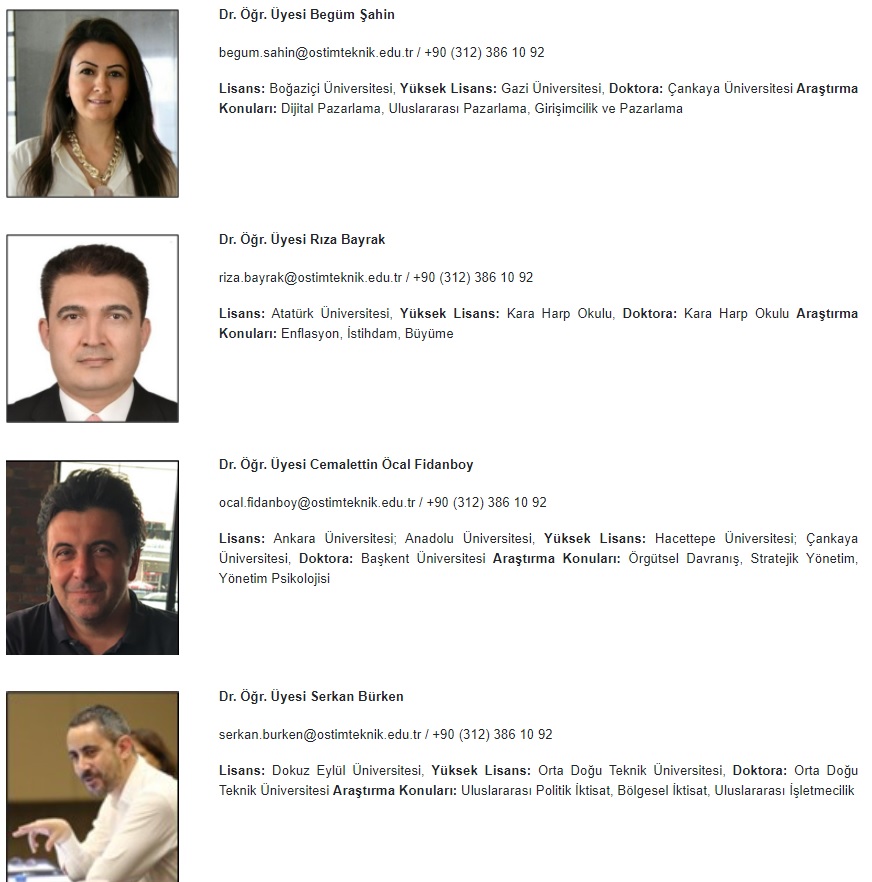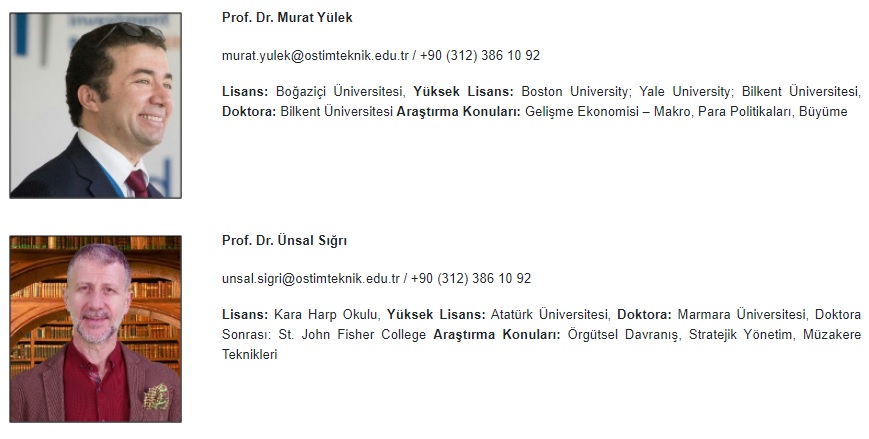Economics
Industrial Policy and Technology Management Master's Program with Thesis (English)

Industrial policies are of great importance in the industrialization process of countries. In order for countries to develop their industries, increase their competitiveness, increase their export capacities by producing technology-based and high value-added products, industrial policies should be designed and implemented scientifically. Technology management, which is a sub-field of industrial policy, is a scientific discipline that deals with the effective management of technological competencies, equipment (tools) and human resources at the level of state institutions, technology ecosystem stakeholders and companies in the country. In order to further accelerate the industrial and technological development of our country, there is a need for qualified personnel specialized in the field of industrial policies and technology management both in government institutions and private sector stakeholders. The purpose of establishing the SPTY Master's Program at OSTİM Technical University is to meet the stated need for qualified people, to train academicians in these fields and to contribute to accelerate the technology-based industrial development of our country.
For our university, which was established as an "industrial university" and whose campus is located in one of the leading industrial zones of our country such as OSTİM, it is of great importance for a "more efficient and competitive" industry to produce information in fields such as economics and business as well as technical knowledge and to contribute to the development of human resources. Through the SPTY Master's program, it is planned to increase the number and quality of researchers, academics and professionals working in the field of industrial policy and technology management at our university. In this way, it will contribute to better equipping experts working in the fields of industrial policy design and implementation and technology management, both in the public, academic and private sectors. Ultimately, more effective industrial policies and technology management will increase Turkey's competitiveness, export capacity and level of development.
Course-Course Details
| First Semester | K | AKTS | |
| PT701 | History of Science and Technology | 3 | 7,5 |
| IPT703 | Goverment Intervention and Market Failures | 3 | 7,5 |
| IPT705 | Scİentific Research Methods and Ethics | 3 | 7,5 |
| Elective | 3 | 7,5 | |
| TOTAL | 12 | 30 | |
| İkinci Yarıyıl | K | AKTS | |
| IPT711 | Technology, R&D and Innovatİon Management | 3 | 7,5 |
| IPT713 | Industrial and Innovation Policy Design | 3 | 7,5 |
| Elective | 3 | 7,5 | |
| IPT780 | Seminar | 0 | 7,5 |
| TOTAL | 9 | 30 | |
| Third Semester | K | AKTS | |
| IPT790 | Thesis | 0 | 30 |
| TOTAL | 0 | 30 | |
| Forth Semester | K | AKTS | |
| IPT790 | Thesis | 0 | 30 |
| TOTAL | 0 | 30 | |
| General Total | 21 | 120 |
MASTER'S DEGREE WITH THESIS COMPULSORY COURSES
IPT701 History of Science and Technology AKTS 7,5 – Kredi (3+0) 3
The aim of the course is to give information about history of science and technology. The historical understanding gives students opportunities to deeply examine how science and technology go hand in hand through the generation of modern societies. The nature of scientific inventions and technological innovations will provide students important clues about designing efficient policies in order to foster scientific research, technological innovations and finally, industrial policies. The course will show how economics of innovation discipline is analysing the effect of scientific and technological developments on economic growth and development.
IPT703 Government Intervention and Market Failures AKTS 7,5 – Kredi (3+0) 3
This course aims at examining different schools of economic thought with a special emphasis upon government intervention. The rationale for government intervention and the role of government on markets will be evaluated in order to make effective industrial policies and to make possible interventions to overcome market failures to enhance innovative activity. This course provides deeper understandings and new insights for students to address the question why governments support innovative activity and/or why governments should design and implement industrial policies.
IPT705 Scientific Research Methods and Ethics AKTS 7,5 – Kredi (3+0) 3
The aim of the course is to provide deeper understanding of scientific research methods and conducting effective research studies without neglecting ethical principles. The content of this course covers designing and implementing research studies in the field, the issue of ethics in scientific studies and publishing and the practical limitations of modelling the real-World problems. The formulation of research questions/hypotheses, definitions of research structures, sampling methods, threats with internal and external validity, topics such as quantitative and qualitative research, data analysis will be introduced. Writing a research report will be mandatory for implementing the teaching outcomes during the lecture.
IPT711 Technology R & D and Innovation Management AKTS 7,5 – Kredi (3+0) 3
The aim of this course is to explain the place and the importance of technology, R & D and innovation management in today's world. The course will provide information on how to successfully manage innovations in micro, mezo and macro level. In this course, product and process innovation, organizational innovation, business models, innovation strategies, innovation resources and innovation management will be discussed.
IPT713 Industrial and Innovation Policy Design AKTS 7,5 – Kredi (3+0) 3
The aim of this course is to generate comprehensive understanding of policy design for innovation and industrial development. Currently, effective industrial policies cannot be separated from the process of innovation. Thus, a full understanding of the nature of innovation process is required. In this course, innovation systems approach both in regional and national level will be introduced. In addition, the planning perspectives for industrial development, several industrial policies and country models will be examined in order to culminate innovation and industrial policy making with each other.
Some Recommended Elective Courses:
IPT721 Business Economics AKTS 7,5 – Kredi (3+0) 3
The aim of this course is to explain the basic concepts of global business, to comprehend the methods of introduction to global markets and to evaluate the changes in the management and business functions of globalized enterprises. Basic Concepts of Global Management and Historical Development, Global Environmental Assessment, Globalization Process Theories, Globalization, Regionalization, International Trade Organizations and Integrations, Cultural Factors, Ethical Practices, Social Responsibilities, Global Value Chains, Supply Chain Management and Production Management in Globalized Enterprises, Marketing Management in Globalized Enterprises, Human Resources Management and Leadership in Globalized Enterprises, Financial Management and Accounting Management in Globalized Companies Management Information Systems Management in Globalized Companies constitute the content of the course.
IPT 723 Supply Chain Management AKTS 7,5 – Kredi (3+0) 3
With this course, the main parties such as suppliers, businesses, external parties and customers in the business environment, and information on basic processes such as production planning, material planning, procurement, warehouse, production, quality, import, export, shipment within and between these parties. physical and institutional resource planning applications.
IPT 724 Strategic Management
The aim of this course is to introduce the fundamentals of Strategic Management. Several tools such as SWOT, Strategic Planning, Strategic Implementation, Strategic Control processes will be examined. Giving information about what are the policies and methods for determining the ways they will follow in forming prospective visions and missions so that enterprises (private or public) can continue their lives in the days of increasing competition. It includes examination of specific strategies.
IPT725 Business Model and Entrepreneurship Strategy AKTS 7,5 – Kredi (3+0) 3
The aim of this course is to provide an understanding of entrepreneurship from a social and economic perspective and to create a culture of entrepreneurship in a narrow framework. The course includes various entrepreneurial cultures, the characteristics of producing societies, cultural elements that enable the development of entrepreneurship, social and cultural measures to ensure the continuity and institutionalization of family companies.
Lecturers




